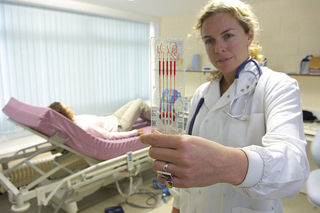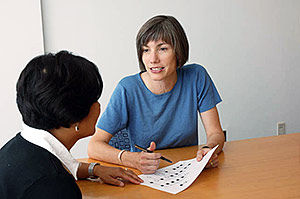
Career
Consider A Master's Degree In Genetic Counseling
Genetic counseling integrates clinical psychology and the natural sciences.
Posted November 8, 2016
Recently I (Jonathan) I went to a talk about careers in clinical psychology. Besides the usual discussion of careers involving a PhD in clinical, counseling, and school psychology and PsyD in clinical psychology a lot of the talk was devoted to careers with a Master’s degree. There were a number of career paths that one can take with a Master’s, and one that really stood out to me was that of a genetic counselor. After the talk I decided to find out more about this career path and I wanted to share what I learned about genetic counseling, and why this might be a great direction for you:

1) Genetic counselors are trained to interpret genetic test results as well as counsel individuals and families seeking information about inherited conditions. The latter may include discussing how these conditions may affect them or their families, how family history may impact the chances of a particular condition, and what genetic tests may be appropriate for a particular individual. It is critical that genetic counselors are skilled in communicating the complex language of genetic issues into terms that the layperson can understand. Thus, it can be stated that genetic counselors serve as patient advocates. It should also be noted that genetic counselors serve as a resource to physicians.
2) Those who visit with a genetic counselor may be those with family members who have a birth defect or genetic disorder. Also, those who may be at risk for such a defect or disorder (e.g., cancer) may see a genetic counselor. Finally, a pregnancy may warrant a visit to a genetic counselor to determine risk factors and whether prenatal testing is warranted. Just to add a couple of quick points about pregnancy issues. A genetic counselor may meet with individuals prior to conception when both parents carry a certain trait or to discuss any risks involved with or discovered during prenatal testing. For example, a woman over 35 may be offered amniocentesis where the amniotic fluid is tested for chromosome abnormalities, neural tube defects, and genetic disorders. A genetic counselor will offer information about the amniocentesis itself so assist the woman with deciding whether to have the test. If the test is taken, a genetic counselor will discuss the results of the test to allow the woman and her partner to make a decision as to whether or not to continue with their pregnancy, and can also provide information about preparing for the birth of a child with medical issues.
3) If you are thinking about becoming a genetic counselor there are some things you can do while you are an undergraduate that will strengthen your resume when you apply to graduate school. For example, try your best to get lab experience. Also, consider getting an internship that involves working with others, and/or volunteering or interning in a medical or healthcare field. Finally, in in addition to your Psychology courses your application will be much stronger with courses in Biology, Genetics, and Biochemistry.

4) To become certified as a genetic counselor one must have an undergraduate degree, and then obtain a Master’s degree in genetic counseling from an accredited program in the US and Canada. A list of these programs can be found here: http://gceducation.org/Pages/Accredited-Programs.aspx. Upon graduation, you can apply for a certification exam. In the US you are certified by the American Board of Genetic Counseling, and in Canada, you are certified by the Canadian Association of Genetic Counsellors.
5) Once certified, a genetic counselor will likely work in a university medical center, private and public hospitals, or a physicians’ offices. Consistent with the role of these counselors, they often work with obstetricians and oncologists. The Bureau of Labor Statistics noted that jobs for genetic counselors is projected to grow 29 percent in the next 10 years; faster than the average for all occupations. In addition, the bureau noted that the median salary for a genetic counselor is $72,090 per year—nice pay!
I hope you have a picture of an interesting career option with the above description of a genetic counselor. For more information you might want to check out the website for the National Society of Genetic Counselors at http://www.nsgc.org/
Please note that the comments of Dr. Golding and the others who post on this blog express their own opinion and not that of the University of Kentucky.
Want more?
Use our website to explore the variety of careers that exist for those interested in psychology.

